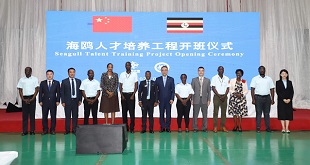
By Agnes E. Nantaba
Simon Peter Akugizibwe is the Airtel Marketing manager-Data and Devices. He spoke to Agnes E. Nantaba about the data market in Uganda and the telecom’s strategies to grow penetration.
What are the key trends on the data market in Uganda?
We are seeing two stimuli; from the telecom or ICT companies coming up with innovations and apps which are shaping the consumption behavior of customers to consumer preferences. For example Airtel launched multi-surf that allows people to share data and others like the Airtel money app. But it’s not only telecoms driving this; consumers are also an important input and the biggest among them is the increasing use of smart phones as an internet tool. Looking back seven or more years back when internet was looked at as a service for the affluent, the corporate and high earners with satellite links and connections on laptops to today when even boda riders or the unemployed youths have affordable smart phones connected to the internet. Consumer preference for smart phones has forced all telecommunications companies to reposition their internet offerings to smart phones. One big change is that penetration has increased for everyone. It is a synergy between operators and consumers on changing trends.
Airtel recently launched a multi-surf promotion dubbed ‘Tugabane.’ What prompted you to introduce that product?
It’s not a promotion but a permanent product or tariff with no limit to when it will end; Tugabane in our local language simply means ‘let us share’. The product allows one user with a single internet bundle to add up to four other users to access that same data bundle simultaneously. Uganda is a country of multiple cultures but one thing we have in common is sharing. Internet has become part of consumers’ lifestyle and so it was only natural to come up with a product where consumers can share internet in a spirit of what Ugandans are best known for.
How successful has it been in the market so far?
The product is so powerful that one can share bundles with anyone even in the farthest district of Uganda. It is actually more powerful than WIFI. Statistic wise it has increased penetration by 20% of our data usage. It has increased Airtel investment in infrastructure and more data skilled resources to manage the development. Even the filtration of the word ‘Tugabane’ has gone deep to becoming a household name. It has even reinforced the Airtel brand as a sharing and caring network.
The data market is gradually getting more and more competitive. What is Airtel’s competitive advantage?
Our competitive advantage is always getting in touch with customers. We are the first in the industry to launch game changing products. Products like ‘Tugabane’, a mobile money app that allows you to access your mobile money services using an application and a data credit service that allows you to borrow data if you run out of airtime and pay later. When one product stands out as being game changing after close engagement with the customers, we enhance it to another level.
What are the major issues in expanding internet and data usage in Uganda?
This is both at macro and micro level. Broadly, education is a social problem in Uganda; the market is ready for internet, but do the consumers have knowledge on how internet will benefit them so as to increase penetration? So Airtel through CSR programmes strives to educate consumers on the benefits of using internet.
The economic stand is also an issue as people who live below the poverty line cannot afford the most affordable devices as low as US$10. The culture among the older segments that still have a negative perception on new platforms – they are skeptical and worried about their exposure on the internet.
How successful has the One Network Area Integration been so far?
It has been a very phenomenal value preposition that was launched in the days when we were branded as Celtel. One key benefit is that we currently live in a global environment. Regionalisation has increased cross border movements within and outside Uganda and from all countries where Airtel is present.
The growth in traffic shows that this is a phenomenal product. The recent introduction of One Network Data Roaming where we have one rate across 17 countries is also another example of effort to enhance the product further.
What’s Airtel’s strategy for bringing more internet users on board?
One word smart phones; Airtel is pushing smart phone penetration across all platforms. The prices of smart phones are falling and penetration growing across the youth segment. We have increasingly put investments behind affordable smart phones. We have educated people on the life style of smart phones to drive the perception of consumers towards smart phones.
The high cost of access devices such as smart phones and tablets is still a hindrance to access. How has Airtel helped to solve the problem?
We have partnered with local suppliers who have enough stock such that we can still push affordable smart phones to the end consumers without impacting on the cost.
Where do you see data usage and internet penetration in Uganda in the next few years?
Data usage is growing month in and out and we foresee the curve growing exponentially in the next six months. We see people adopting digital lifestyle, transacting business online, and studying online or even connected in the middle of the night. We see a future where most of the things we do will be highly digitised.
Where do you see Airtel Uganda in the next few years?
Airtel will be the leading brand in the Ugandan Telecommunications industry and an internet lifestyle provider with the most innovative solutions in the market. We have strategies and plans to maintain our edge ahead in the market.
 The Independent Uganda: You get the Truth we Pay the Price
The Independent Uganda: You get the Truth we Pay the Price


